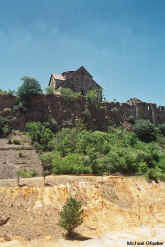|
UNDER
CONSTRUCTION
|
On
the main road next is
Neghots
(formerly Gomahand), which has khachkars and,
in the cemetery, 3rd-2nd millennium BC cliff
carvings. |
|
Crossing the
Debed on an
unsignposted bridge to an industrial appendage
of Akhtala,
heading N, then bearing W, you reach the 13th c. monastery
at Akhtala, with three churches, the largest to the Mother of God, inside
a 10th c.
fortress. The
monastery is thought to be the one attested
by medieval writers
as Pghndzahank ("Copper mine").
In
|

|
|
|
|
1763,
King Herakli II of Georgia brought Greek miners to work the ore
deposits nearby, and their inscriptions can be found on the monastery
walls. The village has a 13th c. spring
monument. Left from the entrance to Akhtala one can
notice scant remains of a medieval
fortress, occupied by cave complex.
By the village was a large Early Iron Age
cemetery. |